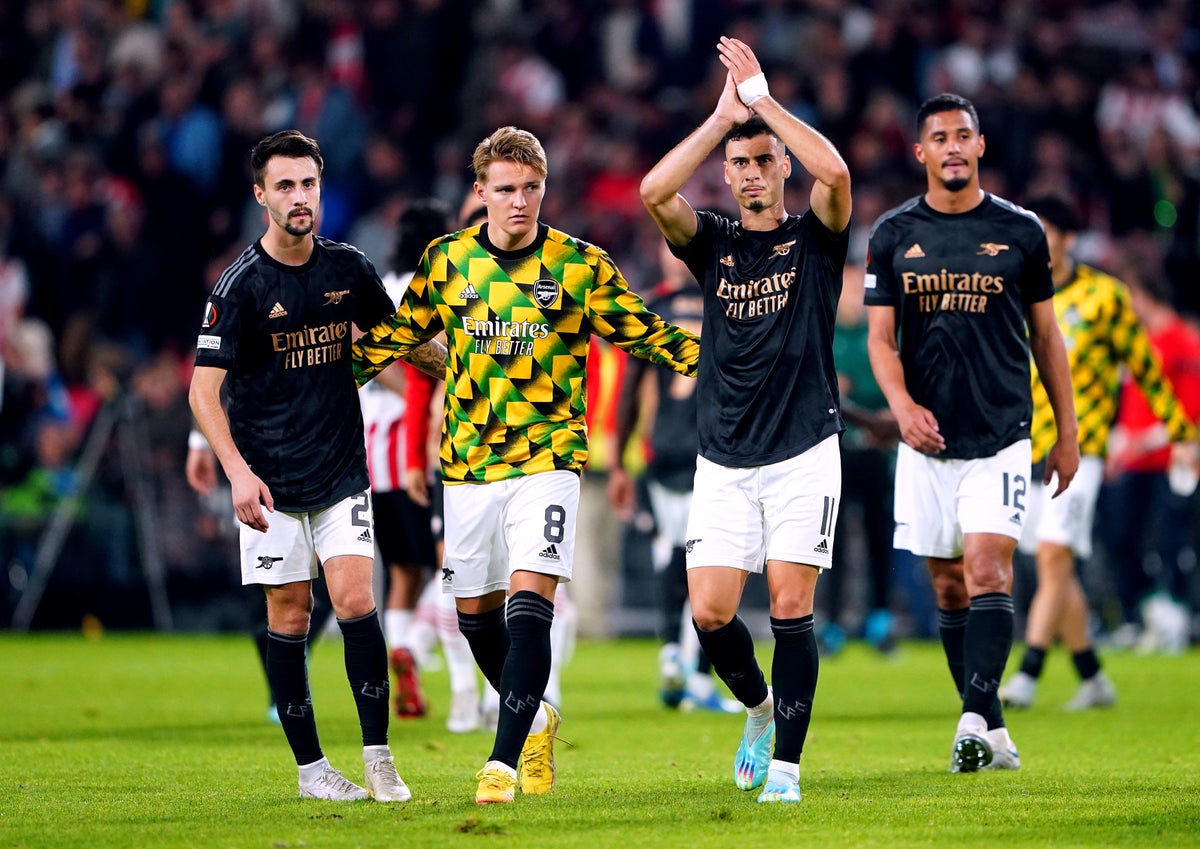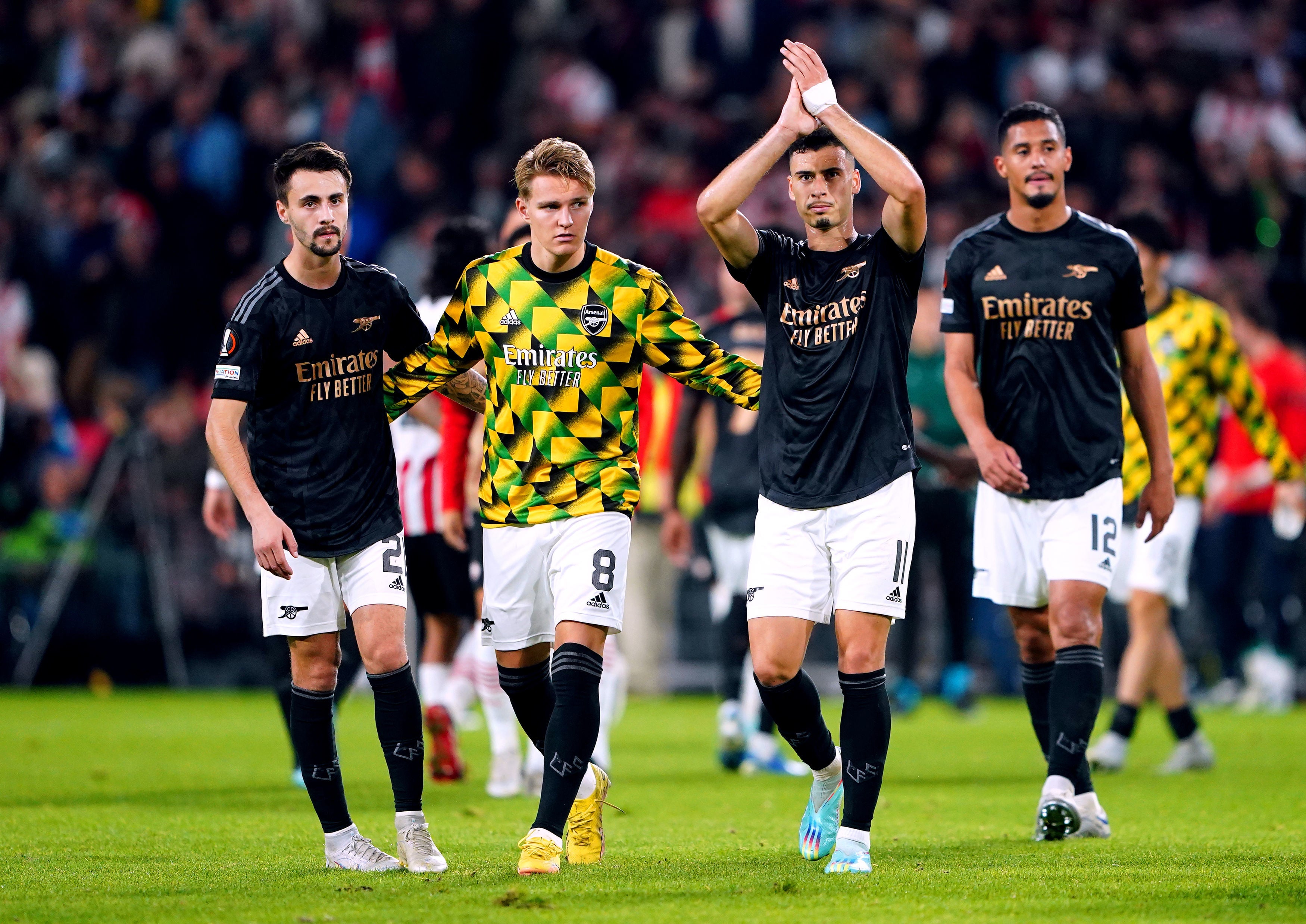
In the season when virtually everything had gone right, it was the night when it all looked wrong. Managers rarely call for a reset from a vantage point at the top of the league, but Mikel Arteta did. And if it points to his tendency to be blunt, Arsenal may need to go back further than last week, when they had just chalked up an eighth straight win. To a little further back, however, arguably.
There were reasons to believe a loss had been becoming, though not one as comprehensive as their evisceration in Eindhoven. The last time Arteta had sounded as searingly critical or his side as bad, it was the day Arsenal’s Champions League dream died at Newcastle in May.
A Europa League group-stage defeat does not come with the same consequences but, five months on, Arteta illustrated he has not lost his capacity to surgically dissect his team. That a disastrous display on Tyneside and a shocking showing against PSV were separated by 14 wins in 16 games illustrates the progress made in the meantime. His latest inquest at least comes after a stunning run.
Yet it was multi-faceted. There was a struggle to respond to a setback, and after PSV’s 2-0 win, Arteta lamented: “The moment something went wrong we just went down and didn’t know how to react.” There was the blunt admission his side were found very wanting. “Today we were extremely poor,” he said. “We were nowhere near our level.” There was the lack of goals. “We didn’t have the threat and aggression we’ve been playing at and that is worrying,” Arteta added.
Perhaps those sentiments could be voiced about many a team that loses; they can be regular reasons for defeats. But these can be recurring themes for Arsenal. In the Netherlands, as on Tyneside, Arteta pointed out that Arsenal had raised expectations with excellence. This time, a defeat comes with far smaller consequences. Yet if a performance this anaemic, a second half so shocking, had scarcely been signposted, there had been signs Arsenal’s brilliance had been confined to the first two months of the season. Since then, they had ground their way to results. Until, suddenly, they did not.
Arsenal have now only scored four goals in their last five games; when they were far more fluent, they delivered 14 in the previous five. There has been a loss of dynamism, a diminishing threat. Only Bukayo Saka and Granit Xhaka have found the net in those five matches and, welcome as the Swiss’ scoring spree has been, it has the feel of an anomaly.
Arsenal have been losing steam, both in games – where first halves have tended to be better than second – and over a campaign. It now seems the World Cup break cannot come soon enough for a squad who, in many cases, will not be headed for Qatar.
Which may be just as well. They could benefit from a break. Arsenal have lost some of their dynamism. While Arteta had said that Saka should want to play 70 games a season and Gabriel Jesus had pronounced himself willing to, the Spaniard benched both in the Netherlands. It was an admission they have been overworked.
But maybe key players are under Arteta. His best runs as Arsenal manager have tended to come with a settled side, and continuity is usually admirable. He has eight ever-presents in the starting 11 in the Premier League and a ninth player, Martin Odegaard, who has only missed one game. Of a possible 990 top-flight minutes, four have played at least 988, three more at least 944. Only 13 players have reached 200, and the understudies have gone largely unused.

A lack of strength in depth proved Arsenal’s undoing last season; summer signings offered the illusion that had changed, but maybe it will always remain an issue under Arteta. If he is yet to master the art of rest and rotation, he can deplete his group and seem to diminish the status of others. As the needless departures of Calum Chambers and Ainsley Maitland-Niles in January showed, he is a manager who can exile fringe figures, further reducing his options, and who only ever seems to have a small core he trusts.
That is exacerbated because there is a drop-off in quality between the best and the rest, particularly in the centre of midfield and the striking position, rendering Jesus, Thomas Partey and Xhaka still more important. It has been harder to rest Saka and Gabriel Martinelli, meanwhile, with Emile Smith Rowe injured and Arsenal’s attempts to sign another winger in the summer failing. Indeed, the Brazilian ended up in Eindhoven as an ersatz left wing back, while Saka and Jesus were summoned in a quest for a point.
In Arteta’s defence, he has made many of Arsenal’s best players better, which in turn means they are still likelier to be required. Yet in the last few weeks, some have been shorn of sharpness. And after they lost their freshness, for only the second time in a terrific season, Arsenal lost a game. It is not a disaster in itself but the warning from last season is that one defeat often turned into two or three.







